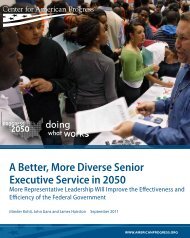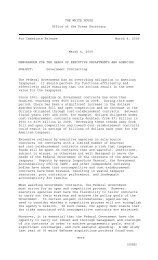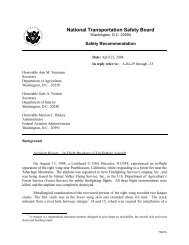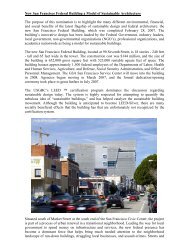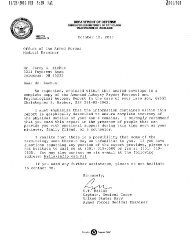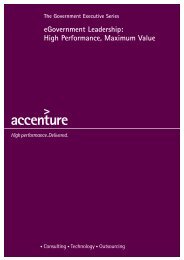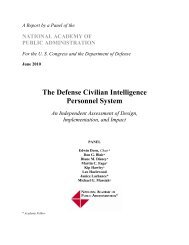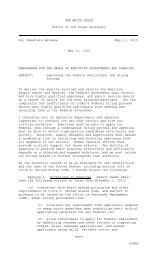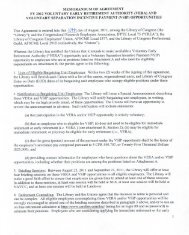Financial Management: Providing a Foundation for Transition - AGA
Financial Management: Providing a Foundation for Transition - AGA
Financial Management: Providing a Foundation for Transition - AGA
- No tags were found...
You also want an ePaper? Increase the reach of your titles
YUMPU automatically turns print PDFs into web optimized ePapers that Google loves.
21Looking <strong>for</strong>wardHow can the government enhance financialmanagement? <strong>Financial</strong> policy makers and executivesin the survey listed the improvement initiatives theythink Congress and Executive Branch leaders shouldcontinue or start—and also what not to do.What to continueSince 2000, legislators and administration policymakers introduced many initiatives aimed atimproving how the government manages itsfinances and uses financial and per<strong>for</strong>mancein<strong>for</strong>mation (see box, Outside mandates <strong>for</strong>financial in<strong>for</strong>mation on page 12). Which arethe most important to continue <strong>for</strong> the next 2to 5 years? Table 3 shows what our executiverespondents think, including financial, OMBand oversight leaders.Table 3:Survey executives’ ranking of current financial managementinitiatives that should be emphasized over the next 2 to 5 yearsInitiative1. Cost, budget and per<strong>for</strong>mance reporting2. Program efficiency and effectiveness (A-123, Section 2)3. <strong>Financial</strong> management systems (A-123, Section 4)4. <strong>Financial</strong> statement audits, continue current depth and scope5. <strong>Financial</strong> reporting (A-123, Appendix A)6. Per<strong>for</strong>mance and Accountability Report7. Increasing the use of shared service providers (FMLOB)8. Effective measurement and remediation of improper payments(A-123, Appendix C)Cost, budget and per<strong>for</strong>mance;program efficiency and effectiveness<strong>Providing</strong> actionable in<strong>for</strong>mation on cost, budgetand per<strong>for</strong>mance so that it can be used to improveprogram efficiency and effectiveness is the cornerstoneof what the CFO organization is supposedto do, according to many survey respondents.Actionable in<strong>for</strong>mation may be sorely needed inthe near future, say several executives, becausethere may not be enough money to continue thestatus quo, much less expand programs. Says one,“We have huge deficits and they may continue,so there will be a contraction in defense spendingonce the wars in Iraq and Afghanistan are over.Economy and efficiency will be important. Whenit comes time to cut back, some people will wantto simply cut out programs because that is the easiestthing to do. The reality is that we won’t be ableto or can’t just cut all those programs. We have tolook at everything and say, do we need this? Whatdo we give up if we do this? Can we make thisprogram better and more efficient? If the answer isno, then the program may need to be cut.”One of the constant themes throughout the 2008survey is to eschew accounting <strong>for</strong> accounting’ssake. Instead, say many respondents, CFOs shouldfocus on adding value to entity programs and mission.Indeed, said one, “There should not be anyef<strong>for</strong>t expended to create financial in<strong>for</strong>mation thatis not of value to manage programs,” says an executive.Making this a reality could result in a strongerrole <strong>for</strong> CFOs in an integrated environment ofaccounting, budget and per<strong>for</strong>mance management.<strong>Financial</strong> management systemsIn the previous section on risks, executives andmanagers listed systems as the third greatest riskto accomplishing their entities’ missions, so itis no surprise that systems initiatives are near



